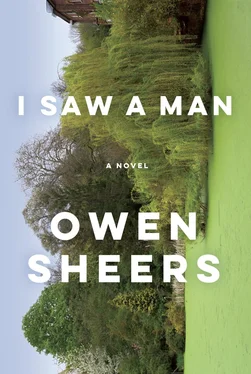―
A tall window rose above the armchair in Samantha and Josh’s bedroom, its frame filled with the leaves of the sycamore outside their house. Opposite was a king-size bed, above which hung an abstract landscape: the suggestion of hills, sky, perhaps a river. On either side the bedside tables marked out the room’s territory. On the right a pile of novels, women’s magazines, a ceramic bowl filled with earrings. On the left a book on the American Civil War, a glasses case, the lead of a phone charger. On the wooden floor, copies of the Financial Times and Herald Tribune. The bed itself was unmade, the duvet a cumulus at its centre. At the other end two pillows were stacked against its head, their shape still holding the depression of a back.
Michael looked over the bed, the clothes on the armchair. So often, over the last seven months, being in the Nelsons’ house had been like reliving echoes of a past life. As he’d helped Lucy build a LEGO car, when he’d watched Samantha and Josh fill the dishwasher or, once, each carry a sleeping daughter up the stairs to bed.
But such moments were visions, not echoes, glimpses of a future life that had been taken from him along with Caroline. A life of children, family. Even this bed before him was such a vision. The bed he and Caroline had shared had always been new. A bed of promise, not years. And it was the years Michael wanted, the accumulation of sharing. A lifetime, not just a marriage.
He turned from the bed. Whatever trace of Caroline had led him up the stairs wasn’t to be found in here. And this wasn’t for him to see, anyway. He felt as if he’d strayed from the corridors of a cruise liner to find himself, unexpectedly, in its engine room, the mechanisms unprepared for public eyes, the working parts worn with keeping an even keel, whatever the seas. He glanced out the window at the quiet street, the sycamore leaves filtering the afternoon sunlight. As he did, he seemed to surface back into the day, into the facts of its ordinariness, the city subdued under the heat. What if Josh were to come home now to find him in their bedroom? How would he explain? What had he been thinking, in coming up the stairs at all? He hadn’t heard a sound since he’d entered the house. Would an intruder really have remained so quiet for so long? The open door was just a mistake, that was all. He should leave now, while he still could. Write a note for Samantha and Josh, close the back door and leave.
ALTHOUGH IN THE months after her death Michael had lost his desire for full knowledge of what had happened to Caroline, there was one question that continued to linger in his mind. Who? That was all he’d still wanted to know. Not why, but who? Who had pressed the button? Who was the person behind the pilot, the operator, the contractor?
Who was the man or woman who’d killed his wife?
What did they look like?
How did they dream?
Who did they love?
What was their name?
―
On a March morning, four months after he’d moved into South Hill Drive, Michael learnt the answer to that final question, when Major Daniel McCullen wrote to him.
The letter had been addressed to his publishers in New York. An intern or mailroom worker had inserted it into a new envelope and written Michael’s address on it in a rounded, flowing hand: Flat 6, 34 South Hill Drive, London, NW3 6JP, United Kingdom. The letter was handwritten, too. A controlled script with little variance, even around the fifth line, where Michael felt surely it should have betrayed something — a break in a descender, a deeper impression on the page — as the mind guiding the pen had written the words I regret to say I was the pilot that day.
Michael first read that line while sitting on the bottom steps of his communal stairwell. He’d been lacing his trainers when the letter, along with the rest of the day’s mail, had slipped through the front door and fallen to the mat beneath. Charity brochures, bank statements, a travel magazine for a long-moved-out tenant, and, bearing a New York postmark, a letter addressed to Mr. Michael Turner.
For the past two months Michael and Josh had been meeting twice a week to walk and jog on the Heath. The days on which they met were dictated by the shifting pattern of Josh’s work schedule, which was, in turn, defined by the state of various foreign markets. But whatever the day, they’d always managed to keep their agreement. For Josh it was part of a New Year’s resolution to lose weight and counter the hours he spent each week under office lights and on the Tube. For Michael the exercise was to get fit for his fencing, to break the day in his flat between waking and working, but also to ease his sciatica, the consequence of a schoolboy injury that had recently returned from across the years to cramp his right leg each morning. He didn’t know what had brought it on again — whether it was the fencing or having returned in earnest to The Man Who Broke the Mirror, the long hours at his desk. Or, even, he sometimes found himself wondering, was it another process of his grieving? A slippage of whatever leaden weight had sat in his chest since Caroline’s death down his body to cannonball itself in his calf instead. Whatever the cause, its electric grip on his lower back, the muscles in his right buttock, had Michael limping from his bed to the bathroom each morning. It was only after thirty minutes of extended walking that his leg would begin to loosen and he could once more flex his right foot freely again.
As Michael, sitting on the stairs, read that fifth line, he’d felt the heat leave his body. The stairwell seemed to pulse about him, his vision to blur. He returned to the letter’s opening. Dear Mr. Turner, it read. I understand this is a letter you most probably do not want to receive, but I hope on reading it you might come to appreciate why I felt both compelled and morally bound to write to you.
Michael flipped the page over, scanning to the letter’s end. An unreadable signature, its letters printed below. Daniel McCullen. So that was his name. That was the name of the man who’d killed his wife, written in ink by the same hand that had held the controls of that Predator, that had released, via touch, fibreoptic, satellite, hydraulics and hinge, two Hellfire missiles, their thrusters burning, into the clear mountain skies above her head.
For a while Michael did no more than stare at the name. Daniel McCullen. Eventually, as his focus returned, he turned the page again and read the letter from the start once more. Dear Mr. Turner. When he reached the signature for a second time he folded the letter into its envelope, then folded the envelope into the pocket of his shorts before standing, his head light, to take himself and this new knowledge, burning at the front of his mind, out into the city’s winter morning.
All through his walk and jog with Josh that day — around the men’s pond and up the eastern side of the Heath to skirt the grounds of Kenwood House and back through the woods to Parliament Hill — Michael had felt the letter’s edges rubbing against his thigh, its words distilling, like the slow release of a drug, through his body and his mind. The day was overcast, the Heath’s sandy soil waterlogged under their feet. Lone walkers followed their dogs through the bare woods. A single woman was swimming in the mixed pond, her blue cap making slow, bright progress between a swan and a resting gull bobbing in her wake.
At first, as they’d walked, it was Josh who had talked. About Samantha wanting to go back to work, or to college. “It’s doesn’t seem to matter to her which,” he’d said, as they’d strode along the lower paths. “Which is my problem with it. I mean, I don’t mind her working, course I don’t. Sure, it’ll make things harder with the girls, and Christ knows she doesn’t need to, but well.” He’d paused, for breath, not thought. “If she’s gonna make it more difficult, she may as well have some focus about what she does. You know what I mean?”
Читать дальше











